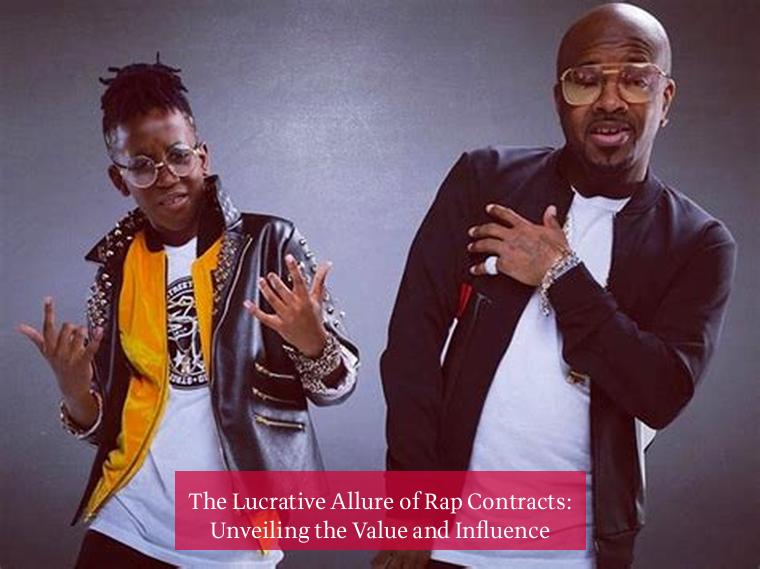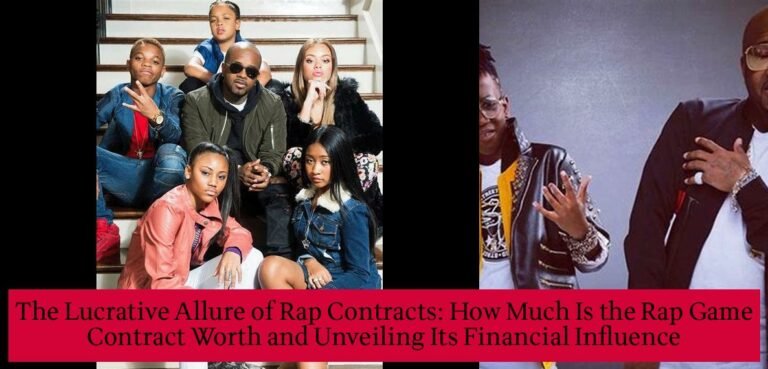Unveiling the Lucrative Allure of Rap Contracts: How Much Is the Rap Game Contract Worth?
Have you ever wondered about the jaw-dropping figures behind the rap game contracts? From record sales to live performances and merchandise, the financial powerhouse of the rap game is a force to be reckoned with. Join us as we delve into the intriguing world of rap contracts, uncovering their monetary value, non-financial perks, and their profound impact on shaping careers and industry dynamics. Get ready to explore the financial landscape of the rap game and understand the key provisions that make these contracts worth their weight in gold. Whether you’re an aspiring artist or a curious music enthusiast, this deep dive into the rap game’s financial labyrinth is bound to leave you astounded and enlightened.
Key Takeaways
- Latto signed a contract with RCA Records after releasing her debut song “Bitch from da Souf” in 2019.
- She rejected signing to Jermaine Dupri’s So So Def Recordings label after winning the first season of The Rap Game.
- Latto’s net worth as of 2024 is estimated to be around $2 million, showcasing her dedication and talent in the music industry.
- Gillie Da Kid claimed Jay-Z threatened to blackball him, highlighting the challenges in the rap industry.
- The Rap Game’s revenue was approximately $2.7K in 2020, showcasing the financial aspects of the rap game.
- Gillie Da Kid and Wallo267 were named hip-hop’s highest-paid, emphasizing the potential returns from rap contracts.
The Lucrative Allure of Rap Contracts: Unveiling the Value and Influence

The rap industry has emerged as a formidable force in the entertainment landscape, captivating audiences with its infectious beats, lyrical prowess, and larger-than-life personalities. Behind the glitz and glamour, rap contracts play a pivotal role in shaping the financial fortunes and career trajectories of these musical stars. In this comprehensive exploration, we delve into the intricacies of rap contracts, examining their worth, the factors that influence their value, and the impact they have on the rap game.
The Financial Powerhouse: Unraveling the Monetary Value
Rap contracts can be incredibly lucrative, with top artists commanding multi-million dollar deals. These contracts encompass a wide range of provisions, including recording, distribution, publishing, and merchandise rights. The financial value of a rap contract is influenced by several key factors:
- Artist’s Popularity and Success: Established artists with a proven track record of success can negotiate more favorable terms, including higher royalties and advances.
- Label’s Reputation and Resources: Major record labels often offer more comprehensive contracts with larger financial incentives, but they may also demand a greater share of the profits.
- Negotiation Skills: The ability to negotiate effectively is crucial in securing a lucrative rap contract. Artists with strong representation and a clear understanding of the industry can maximize their earnings.
Also read Coach K Rapper Net Worth: Unveiling the Financial Symphony of a Music Mogul
Beyond Money: The Non-Financial Perks of Rap Contracts
While financial compensation is a primary consideration, rap contracts also provide a range of non-financial benefits that can significantly enhance an artist’s career:
- Distribution and Promotion: Record labels provide artists with access to extensive distribution networks and promotional resources, ensuring their music reaches a wider audience.
- Production and Marketing Support: Labels offer support for music production, marketing campaigns, and image management, helping artists refine their sound and build their brand.
- Industry Connections: Contracts often connect artists with influential figures in the music industry, opening doors to collaborations and career-advancing opportunities.
The Impact on the Rap Game: Shaping Careers and Industry Dynamics
Rap contracts have a profound impact on the rap game, influencing both individual artists and the industry as a whole:
- Artist Development and Growth: Contracts provide artists with the resources and support they need to develop their craft, experiment with different sounds, and establish themselves in the competitive music scene.
- Industry Trends and Evolution: The terms of rap contracts can shape industry trends and influence the direction of the genre. For instance, the rise of streaming services has led to adjustments in royalty structures.
- Power Dynamics: Contracts can create power imbalances between artists and labels, with major labels often holding significant leverage in negotiations. Understanding the power dynamics is crucial for artists to protect their interests.
The Rap Game’s Financial Landscape: Exploring Revenue Streams and Earnings
The rap industry generates substantial revenue from various sources, contributing to the financial success of artists and record labels alike:
Record Sales: A Cornerstone of Revenue
Record sales remain a significant revenue stream for the rap industry. Physical sales, such as CDs and vinyl, still account for a portion of earnings, but digital downloads and streaming services have become dominant. Artists receive royalties on each unit sold or streamed.
Live Performances: Connecting with Fans and Generating Income
Live performances are a lucrative revenue source for rap artists. Concerts, festivals, and tours allow artists to connect with their fans directly while generating substantial income. Ticket sales, merchandise sales, and sponsorship deals contribute to the overall earnings from live performances.
Merchandise and Branding: Extending the Reach of Rap
Merchandise sales, including clothing, accessories, and collectibles, provide additional revenue streams for rap artists. Partnerships with brands and endorsements can further enhance their earning potential.
Streaming Services: A Modern Revenue Frontier
Streaming services have revolutionized the music industry, providing a significant revenue stream for rap artists. Platforms such as Spotify, Apple Music, and Tidal pay royalties based on the number of streams a song receives.
The Anatomy of a Rap Contract: Understanding Key Provisions
Rap contracts are complex legal agreements that govern the relationship between artists and record labels. Key provisions include:
>> Unveiling Arcángel’s Net Worth: A Success Story in Reggaeton
Recording and Distribution Rights: The Core of the Agreement
The recording and distribution rights clause outlines the artist’s obligations to record music and the label’s rights to distribute and promote it. This section specifies the number of albums to be recorded, the recording budget, and the territories where the music will be distributed.
Discover: Uncovering the Wealth: How Much Is So So Def Worth and Jermaine Dupri’s Financial Journey
Royalties: The Artist’s Share of Earnings
Royalties are payments made to artists for the sale or use of their music. Contracts typically specify the royalty rates for different revenue streams, such as record sales, streaming, and live performances.
Publishing Rights: Controlling the Song’s Composition
Publishing rights cover the ownership and control of the musical composition, including lyrics and melodies. Artists who retain their publishing rights have greater control over how their music is used and earn royalties from its use in films, television, and other media.
Advance Payments: A Financial Lifeline for Artists
Advance payments are upfront payments made to artists before they have earned any royalties. These advances provide artists with financial support during the recording and promotion process. However, they must be repaid from future earnings.
Navigating the Rap Contract Labyrinth: Tips for Artists
Negotiating a rap contract can be a daunting task, but understanding the key provisions and seeking professional advice can help artists protect their interests:
Due Diligence: Research and Understanding
Artists should thoroughly research the industry, different record labels, and their track records before signing a contract. Understanding the terms and implications of the agreement is crucial.
Read Also : Raekwon Davis Net Worth: Unveiling the Financial Journey and NFL Success
Professional Representation: Enlisting Expert Guidance
Engaging a qualified entertainment lawyer or agent can provide artists with valuable guidance and representation during the negotiation process. They can ensure that the artist’s interests are protected and that the contract is fair and equitable.
Negotiating Power: Building Leverage
Artists with a strong following, proven success, or unique talent have greater negotiating power. Building a loyal fan base and establishing a strong brand can enhance an artist’s position in negotiations.
Alternative Options: Exploring Other Avenues
While record labels provide valuable resources and support, artists may also consider alternative options, such as independent distribution or self-releasing their music. These options offer greater control but require more effort and investment.
What record label did Latto sign with?
Latto signed a contract with RCA Records after releasing her debut song “Bitch from da Souf” in 2019.
Did Latto sign with So So Def Recordings?
No, Latto rejected signing to Jermaine Dupri’s So So Def Recordings label after winning the first season of The Rap Game.
What is Latto’s estimated net worth?
Latto’s net worth, as of 2024, is estimated to be around $2 million, showcasing her dedication and talent in the music industry.
What does Jermaine Dupri think of Latto?
Since Latto’s win on The Rap Game, Jermaine Dupri has received backlash for “dropping the ball” on her, but he clarified that he put Latto’s record out.
What was The Rap Game’s revenue in 2020?
The Rap Game’s revenue was approximately $2.7K in 2020, showcasing the financial aspects of the rap game.
